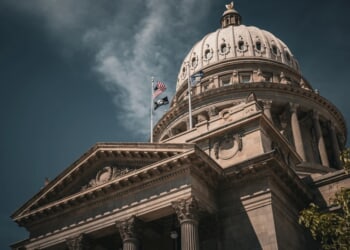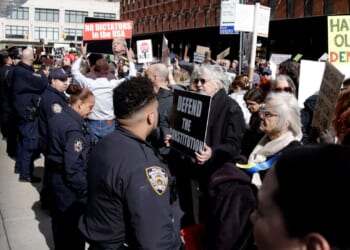Nick Timothy is the Conservative MP for West Suffolk.
There is something utterly compelling about the sight and sound of racehorses in full flight. It is something that stirs emotions in us in way that few, if any, sports can.
And nowhere will that combination of sporting brilliance, courage and glory be better demonstrated than at the Grand National this Saturday. The ultimate test of horse and rider, it is rightly the most famous horse race in the world.
More than 600 million people across 140 countries will watch this year’s heroics, enjoying an event that captures the public’s imagination like no other. Across Britain, millions of people will place a bet on a horse more likely picked for its name, number, or colours than for its chance of winning.
This, for many of us, is what the National is all about: a modest flutter on the race is something that has taken place for generations. It brings family and friends together in front of the TV or radio. It’s something we all talk about afterwards whether we’ve enjoyed enviable success or another hard-luck story.
Last year around 13 million people placed a bet on the race while over 55,000 people flocked to Aintree to watch the race live. The impact of this should not be underestimated. A 2022 study showed that the economic impact of the National festival was over £60m to the local economy.
But the National story is just one part of why horseracing is a cornerstone of Britain’s sporting and cultural life. Horseracing is steeped in our heritage: the first recorded race at Newmarket (in my West Suffolk constituency) took place in 1622 during the reign of King Charles I. The first running of the world’s oldest ‘Classic’ race, the St Leger in 1776, took place nearly 100 years before the first FA Cup final was held.
It is this centuries-old connection that has made racing Britain’s second best-attended sport. Our 59 racecourses attract nearly 5 million attendees each year and the sport is worth over £4bn to our economy.
As Newmarket’s MP I am determined to represent the interests of this wonderful sport in Parliament. And it is vital that I – and like-minded MPs and peers from across the political spectrum – do so. For away from the glamour of the major festivals like Aintree, horseracing is facing serious financial challenges that threaten its future.
Prize money is a huge concern, with Britain lagging behind other nations and our owners increasingly looking to train and run their horses overseas. Less prize money means it is harder for owners to break even and for trainers to hire staff to provide the high-quality care they give their horses. As more horses move abroad, so does the talent and the jobs that go with them.
Why does this matter? As well as its £4bn contribution to the British economy, racing is a significant employer. More than 85,000 people owe their livelihoods to the sport, many in areas where there are few other employment opportunities. No government can afford to ignore those kinds of human and economic realities.
Sustainable prize money – which is the means by which finance cascades through the sport – is vital. The Horserace Betting Levy, paid by bookmakers on their profits, is the central funding mechanism which supports prize money, equine welfare, and veterinary research. The Levy is currently set at ten percent of profits.
While that sounds like a reasonable return the reality is that racing receives less than three per cent of the £13bn bet on the sport every year by British punters. This is by some margin the lowest percentage of any major racing nation.
The Levy was last reviewed by the Conservative Government in 2017. In 2023, as part of its Gambling White Paper, DCMS announced a review of the Levy to be completed by spring 2024. It made clear that the review would consider horseracing’s loss of income from affordability checks on people betting on the sport.
Alongside a failure to increase the Levy, affordability checks are having a huge impact on racing’s finances: turnover is down £1.6bn in two years.
Recently, betting operators have argued that over-zealous regulation by the Gambling Commission saw affordability checks creep in ahead of the White Paper. In turn, the Gambling Commission says it has not mandated those checks. While they can’t both be right, what is clear is that an inconsistent regime of checks has driven many of those who bet on horseracing away from the sport, or worse, to the unregulated black market.
The previous government’s plan to better identify those at risk of gambling-related harm has had unintended consequences. Firstly, for bettors potentially at risk of developing a problem but who have now disappeared from the regulated sector. Secondly, for horseracing which, unlike other sports, is heavily reliant on funding from betting operators.
Securing a Levy increase to mitigate the impact of affordability checks was hours from being delivered when Rishi Sunak called the general election last May. A proposed ringfenced one per cent rise in the Levy for a Growth Fund would have meant an additional £10m could have flowed into the sport, allowing investment in a more competitive and compelling betting product. A golden opportunity to revive racing’s finances was missed
Nearly a year later, Labour has made no progress. Despite horseracing being our second-largest sport, it sits outside the remit of Stephanie Peacock, the Sports Minister. Instead, it sits with Baroness Twycross, the Gambling Minister. As a Lords’ Whip, she inevitably has less time to devote to racing’s issues.
The Government makes much of its growth agenda, despite little evidence of it being delivered. So given how well-placed the sport is to support that agenda, why doesn’t it embrace horseracing?
It is spread across Britain and not just rural areas. Some of Britain’s most popular racecourses are based in urban centres, from Ayr, Doncaster, and Newcastle in the North to Sandown, Epsom, and Newbury in the South. All of these support thousands of jobs and contribute millions of pounds to local economies, and should be central to the Government’s growth agenda.
Today, 23 racecourses are represented by a Labour MP, some of whom sit on the Racing and Bloodstock APPG. Dan Carden, my Labour Co-Chair, fell in love with racing watching the Grand National and now, aptly, represents Aintree. How many Labour voters enjoy a flutter and a day at the races? I would wager a fair few.
This is why our cross-party members of the APPG are calling for the Government to give the nation’s second-largest sport due attention.
It could make a start by reminding itself why horseracing is such an important part of the social, cultural, and economic fabric of this country. Why the majesty of a Thoroughbred galloping at 40mph still captures the imagination of millions of people, just as it did centuries ago.
And there is no better place to start than tuning into the Grand National this Saturday.






![Trump's Admin Guts Another ‘Rogue Government Agency with Zero Accountability’ [WATCH]](https://www.right2024.com/wp-content/uploads/2025/03/Trumps-Admin-Guts-Another-‘Rogue-Government-Agency-with-Zero-Accountability-350x250.jpg)

![‘We All Owe Him (Elon) a Huge Debt of Gratitude’ [WATCH]](https://www.right2024.com/wp-content/uploads/2025/03/‘We-All-Owe-Him-Elon-a-Huge-Debt-of-Gratitude-350x250.jpg)








